形容词比较级
形容词比较级
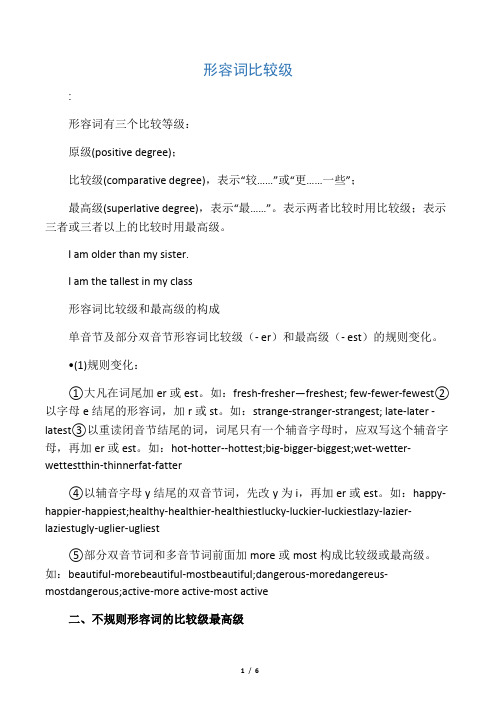
形容词比较级:形容词有三个比较等级:原级(positive degree);比较级(comparative degree),表示“较……”或“更……一些”;最高级(superlative degree),表示“最……”。
表示两者比较时用比较级;表示三者或三者以上的比较时用最高级。
I am older than my sister.I am the tallest in my class形容词比较级和最高级的构成单音节及部分双音节形容词比较级(- er)和最高级(- est)的规则变化。
•(1)规则变化:①大凡在词尾加er或est。
如:fresh-fresher—freshest; few-fewer-fewest②以字母e结尾的形容词,加r或st。
如:strange-stranger-strangest; late-later -latest③以重读闭音节结尾的词,词尾只有一个辅音字母时,应双写这个辅音字母,再加er或est。
如:hot-hotter--hottest;big-bigger-biggest;wet-wetter-wettestthin-thinnerfat-fatter④以辅音字母y结尾的双音节词,先改y为i,再加er或est。
如:happy-happier-happiest;healthy-healthier-healthiestlucky-luckier-luckiestlazy-lazier-laziestugly-uglier-ugliest⑤部分双音节词和多音节词前面加more或most构成比较级或最高级。
如:beautiful-morebeautiful-mostbeautiful;dangerous-moredangereus-mostdangerous;active-more active-most active二、不规则形容词的比较级最高级原级good / wellmany / muchlittleill / bad / badlyfarold比较级bettermorelessworsefarther / furtherolder / elder最高级bestmostleastworstfarthest / furthestoldest / eldest注:older大凡指年龄大小;My father is older than my mother. elder指长幼关系(大凡修饰名词作定语);My elder brother is a driver.farther指距离更远;further指抽像的.I want to study English further.further reading一、原级的用法1.只能修饰原级的词,very,quite,so,too•He is too tired to walk on.他太累了以至于不能再继续走了。
形容词比较级
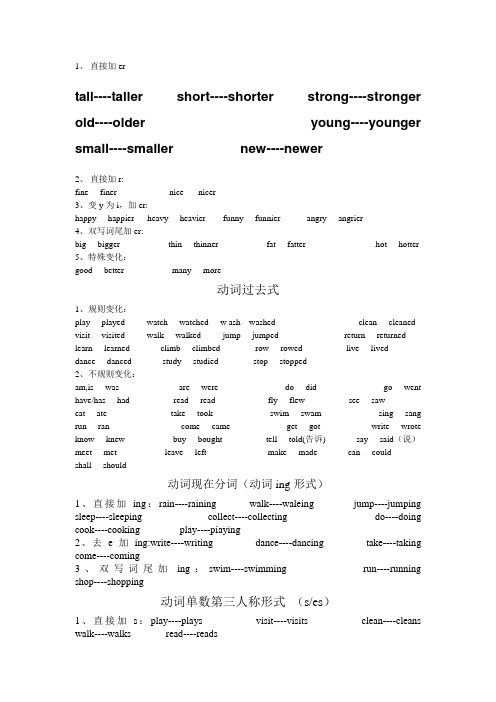
1、直接加ertall----taller short----shorter strong----stronger old----older young----younger small----smaller new----newer2、直接加r:fine----finer nice-----nicer3、变y为i,加er:happy----happier heavy----heavier funny----funnier angry----angrier4、双写词尾加er:big----bigger thin----thinner fat----fatter hot----hotter 5、特殊变化:good----better many----more动词过去式1、规则变化:play----played watch----watched -w ash---washed clean----cleaned visit----visited walk----walked jump----jumped return----returned learn----learned climb----climbed row----rowed live----liveddance----danced study----studied stop----stopped2、不规则变化:am,is----was are----were do----did go----went have/has----had read----read fly----flew see----saweat----ate take----took swim----swam sing----sang run----ran come----came get----got write----wrote know----knew buy----bought tell----told(告诉) say----said(说)meet----met leave----left make----made can----couldshall----should动词现在分词(动词ing形式)1、直接加ing:rain----raining walk----waleing jump----jumping sleep----sleeping collect----collecting do----doing cook----cooking play----piaying2、去e加ing:write----writing dance----dancing take----taking come----coming3、双写词尾加ing:swim----swimming run----running shop----shopping动词单数第三人称形式(s/es)1、直接加s:play----plays visit----visits clean----cleans walk----walks read----reads2、以e结尾直接加s:take----takes write----writes dance----dances come----comes3、以o、s、x、ch、sh结尾加es:watch----watches teach----teaches wash----watches teach----teaches wash----washes go----goes do----does4、以辅音字母加“y”变“i”,然后加“es”:fly----flies study----studies。
形容词的比较级形式
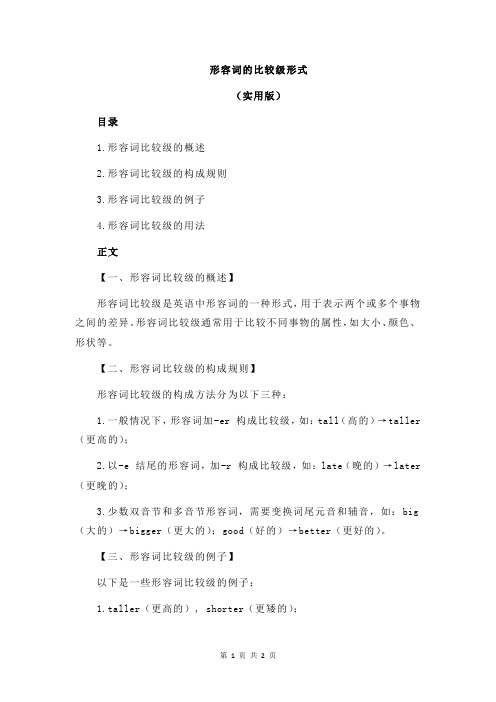
形容词的比较级形式(实用版)目录1.形容词比较级的概述2.形容词比较级的构成规则3.形容词比较级的例子4.形容词比较级的用法正文【一、形容词比较级的概述】形容词比较级是英语中形容词的一种形式,用于表示两个或多个事物之间的差异。
形容词比较级通常用于比较不同事物的属性,如大小、颜色、形状等。
【二、形容词比较级的构成规则】形容词比较级的构成方法分为以下三种:1.一般情况下,形容词加-er 构成比较级,如:tall(高的)→taller (更高的);2.以-e 结尾的形容词,加-r 构成比较级,如:late(晚的)→later (更晚的);3.少数双音节和多音节形容词,需要变换词尾元音和辅音,如:big (大的)→bigger(更大的);good(好的)→better(更好的)。
【三、形容词比较级的例子】以下是一些形容词比较级的例子:1.taller(更高的), shorter(更矮的);2.faster(更快的),slower(更慢的);3.stronger(更强的),weaker(更弱的);rger(更大的),smaller(更小的);5.brighter(更亮的),darker(更暗的)。
【四、形容词比较级的用法】形容词比较级通常用于以下三种情况:1.表示两者之间的比较,如:She is taller than her sister.(她比她妹妹高。
)2.表示三者或以上之间的比较,如:This book is the most interesting of the three.(这本书是三本中最有趣的。
)3.表示程度的加深,如:He is very tall.(他非常高。
形容词的比较级

形容词的比较级形容词是我们用来描述人、事、物的词语,而比较级则是用来表示两个或多个事物之间的程度、大小、数量等差异的词形变化形式。
形容词的比较级能够帮助我们更加准确地表达事物之间的差异,让我们来详细了解一下形容词的比较级以及它在表达中的应用。
一、形容词的比较级构成方式形容词的比较级通常有以下几种构成方式:1. 在形容词后面加上-er例如:- 大 -- 大的 (big -- bigger)- 快 -- 快的 (fast -- faster)- 高 -- 高的 (tall -- taller)2. 在形容词后面加上辅音字母+y,并将-y变为-i,然后再加上-er例如:- 漂亮 -- 更漂亮的 (pretty -- prettier)- 有趣 -- 更有趣的 (funny -- funnier)- 聪明 -- 更聪明的 (smart -- smarter)3. 在形容词前面加上more例如:- 有名 -- 更有名的 (famous -- more famous)- 幸福 -- 更幸福的 (happy -- more happy)- 美丽 -- 更美丽的 (beautiful -- more beautiful)注意:有些形容词的比较级是不规则的,它们的形式变化与一般规则不同,需要我们单独记忆和掌握,例如:- 好 -- 更好的 (good -- better)- 少 -- 更少的 (little -- less)- 多 -- 更多的 (much -- more)二、形容词的比较级的用法形容词的比较级在英语中有广泛的应用,下面列举一些常见的用法:1. 表示两个事物之间的程度、大小、数量等差异例如:- Tom比Mike更高。
(Tom is taller than Mike.)- 我的狗比你的狗更聪明。
(My dog is smarter than yours.)- 这本书比那本书更有趣。
(This book is funnier than that one.)2. 表示某个事物在同类事物中更具特征或特点例如:- 这家餐厅的服务比其他餐厅更好。
形容词比较级有以下几种变化形式

形容词比较级有以下几种变化形式1.形容词原形加-er,如tall---taller,short---shorter,long---longer,fast---faster,old---older,young---younger,small---smaller等。
2.以辅音字母加-y结尾的形容词,把y改成i,再加-er,如:heavy---heavier,happy---happier,funny---funnier等。
3.重读闭音节结尾的形容词末尾只有一个辅音字母,要双写末尾字母,再加-er,如fat---fatter,thin---thinner,big---bigger,hot---hotter等。
例如:太阳比月亮大。
The sun is bigger than the moon.今天比昨天更热。
Today is hotter than yesterday.4.多音节形容词的比较级要用more加形容词原形,如:beautiful---more beautiful,interesting---more interesting,delicious---more delicious,expensive---more expensive,exciting---more exciting等。
例如:这个钱包比那个更漂亮。
This wallet is more beautiful than that one.他的书比你的书更有意思。
His book is more interesting than yours.5.形容词比较级的不规则变化,如:good/well---better。
你的家人或朋友生病了,你可以说I hope you get better soon.希望您早日康复。
又如:bad---worse,如果你最近很忙,但是又遇到很多麻烦事,你可以说Things can’t be worse.真是糟糕透了!其他常见的不规则变化有:old---older/elder,much/many---more,little---less,far---farther/further。
形容词的比较级和最高级大全
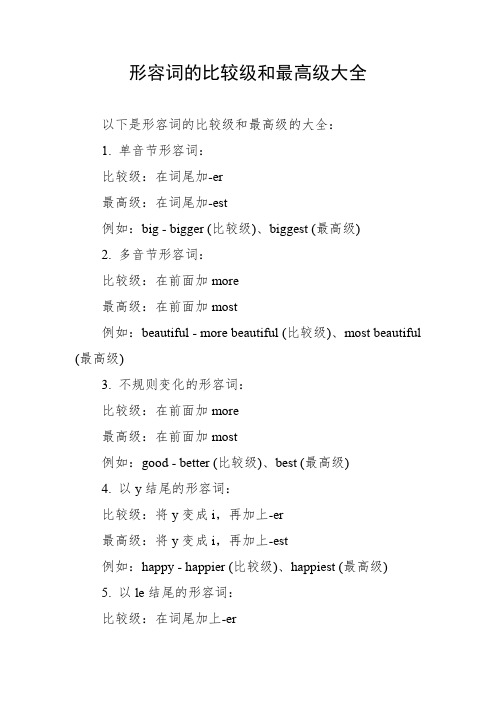
形容词的比较级和最高级大全以下是形容词的比较级和最高级的大全:1. 单音节形容词:比较级:在词尾加-er最高级:在词尾加-est例如:big - bigger (比较级)、biggest (最高级)2. 多音节形容词:比较级:在前面加more最高级:在前面加most例如:beautiful - more beautiful (比较级)、most beautiful (最高级)3. 不规则变化的形容词:比较级:在前面加more最高级:在前面加most例如:good - better (比较级)、best (最高级)4. 以y结尾的形容词:比较级:将y变成i,再加上-er最高级:将y变成i,再加上-est例如:happy - happier (比较级)、happiest (最高级)5. 以le结尾的形容词:比较级:在词尾加上-er最高级:在词尾加上-est例如:possible - more possible (比较级)、most possible (最高级)6. 少数不规则变化的形容词:比较级:在前面加more最高级:在前面加most例如:famous - more famous (比较级)、most famous (最高级)7. 特殊的比较级和最高级:例如:well - better (比较级)、best (最高级)8. 副词的比较级和最高级:比较级:在后面加-er最高级:在后面加-est例如:slowly - more slowly (比较级)、most slowly (最高级)以上是常见的形容词的比较级和最高级,但是也有一些不规则变化的形容词需要记忆。
同时,需要注意的是,有些形容词没有比较级和最高级,如unique。
形容词的比较级大全
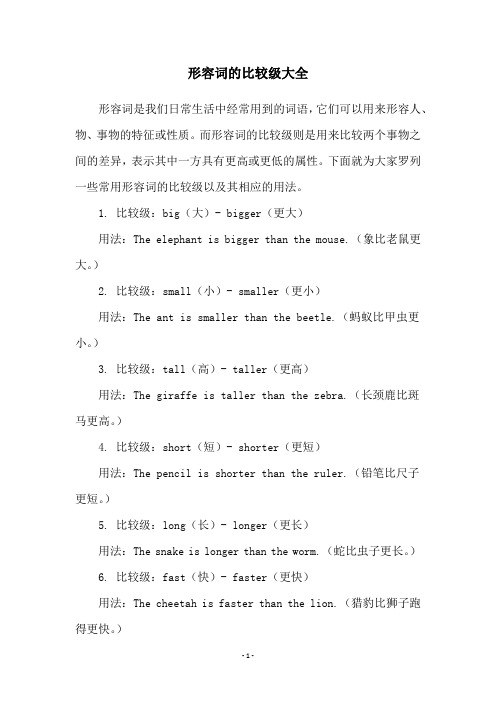
形容词的比较级大全形容词是我们日常生活中经常用到的词语,它们可以用来形容人、物、事物的特征或性质。
而形容词的比较级则是用来比较两个事物之间的差异,表示其中一方具有更高或更低的属性。
下面就为大家罗列一些常用形容词的比较级以及其相应的用法。
1. 比较级:big(大)- bigger(更大)用法:The elephant is bigger than the mouse.(象比老鼠更大。
)2. 比较级:small(小)- smaller(更小)用法:The ant is smaller than the beetle.(蚂蚁比甲虫更小。
)3. 比较级:tall(高)- taller(更高)用法:The giraffe is taller than the zebra.(长颈鹿比斑马更高。
)4. 比较级:short(短)- shorter(更短)用法:The pencil is shorter than the ruler.(铅笔比尺子更短。
)5. 比较级:long(长)- longer(更长)用法:The snake is longer than the worm.(蛇比虫子更长。
) 6. 比较级:fast(快)- faster(更快)用法:The cheetah is faster than the lion.(猎豹比狮子跑得更快。
)7. 比较级:slow(慢)- slower(更慢)用法:The turtle is slower than the rabbit.(乌龟比兔子跑得更慢。
)8. 比较级:easy(容易)- easier(更容易)用法:The multiple-choice test is easier than the essay test.(选择题比论述题更容易。
)9. 比较级:difficult(困难)- more difficult(更困难)用法:Calculus is more difficult than algebra.(微积分比代数更困难。
形容词比较级有以下几种变化形式

形容词比较级有以下几种变化形式1.形容词原形加-er,如tall---taller,short---shorter,long---longer,fast---faster,old---older,young---younger,small---smaller等。
2.以辅音字母加-y结尾的形容词,把y改成i,再加-er,如:heavy---heavier,happy---happier,funny---funnier等。
3.重读闭音节结尾的形容词末尾只有一个辅音字母,要双写末尾字母,再加-er,如fat---fatter,thin---thinner,big---bigger,hot---hotter等。
例如:太阳比月亮大。
The sun is bigger than the moon.今天比昨天更热。
Today is hotter than yesterday.4.多音节形容词的比较级要用more加形容词原形,如:beautiful---more beautiful,interesting---more interesting,delicious---more delicious,expensive---more expensive,exciting---more exciting等。
例如:这个钱包比那个更漂亮。
This wallet is more beautiful than that one.他的书比你的书更有意思。
His book is more interesting than yours.5.形容词比较级的不规则变化,如:good/well---better。
你的家人或朋友生病了,你可以说I hope you get better soon.希望您早日康复。
又如:bad---worse,如果你最近很忙,但是又遇到很多麻烦事,你可以说Things can’t be worse.真是糟糕透了!其他常见的不规则变化有:old---older/elder,much/many---more,little---less,far---farther/further。
形容词的比较级

形容词的比较级形容词的比较级1.含义绝大多数形容词有三种形式 ,原级 ,比较级和最高等,以表示形容词说明的性质在程度上的不一样。
(1)形容词的原级 :形容词的原级形式就是词典中出现的形容词的原形。
比方:poor,tall ,great,glad,bad。
(2)形容词的比较级:形容词的比较级表示“更”,用于二者之间的比较,用来说明“前者比后者更”,比较级前方一般用 much, even, a little,a lot 修饰,此中 even, much 只好修饰比较级。
2.形容词比较级的构成:单音节词和少量双音节词:类型large单音节词和少辅音字母加 y 结尾时把 y 变 easy数双音节词i,再加 -erhappy重读闭音节结尾而且只有big一个辅音字母时,双写最后hot的辅音字母,再加 -erfat/thin多音节词和部分双音节词:类型构成方法多音节词和部分双在原级前加more 音节词在原级前加 lesslargereasierhappierbiggerhotterfatter/thinner构成方法一般直接加 -er不发音的 e 结尾时加 -r 原级longtalllate 比较级 longertallerlater原级carefulbeautifulimportantuseful 比较级more carefulmore beautifulless importantless useful少量不规则变化:good → betterbad→ worsefar→ farthermany/much→ morelittle→ less等3.形容词比较级的用法 :(1)当两个人或事物( A 和 B)进行比较时,我们需要用到形容词的原级或许比较级①表达“A大于 B”用“比较级 +than ”的结构。
公式 :A+be动词 +形容词比较级 +than+BI am taller than you.我比你高。
②表达“A和 B 相同”,用 as as的结构。
英语形容词比较级
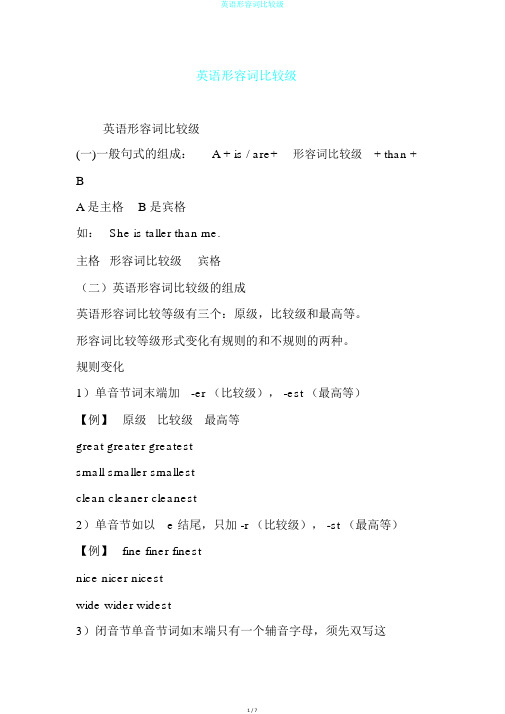
英语形容词比较级英语形容词比较级(一)一般句式的组成: A + is / are+形容词比较级+ than + BA 是主格B 是宾格如:She is taller than me.主格形容词比较级宾格(二)英语形容词比较级的组成英语形容词比较等级有三个:原级,比较级和最高等。
形容词比较等级形式变化有规则的和不规则的两种。
规则变化1)单音节词末端加-er (比较级), -est (最高等)【例】原级比较级最高等great greater greatestsmall smaller smallestclean cleaner cleanest2)单音节如以 e 结尾,只加 -r (比较级), -st (最高等)【例】fine finer finestnice nicer nicestwide wider widest3)闭音节单音节词如末端只有一个辅音字母,须先双写这个辅音字母,再加-er (比较级), -est (最高等)【例】big bigger biggesthot hotter hottestred redder reddest 4 )少量以 -y , -er ,ow ,-ble 结尾的双音节词,末端加-er (比较级),-est (最高等)。
以-y 结尾的词,如 -y 前是辅音字母,则变 y 为 -i ,再加 -er 和 -est 。
以-e 结尾的词只加 -r 和-st 。
【例】 clever cleverer cleverestnarrow narrower narrowest ableabler ablesteasy easier easiest5)其余双音节和多音节词皆在前方加单词more 和 most 。
【例】careful more careful most carefuldifficult more difficult most difficultdelicious more delicious most delicious不规则变化原级比较级最高等good/well better bestbad worse worstmany/much more mostlittle less leastfar farther/further farthest/furthest注:有些形容一般没有比等。
常见形容词的比较级和最高级有哪些
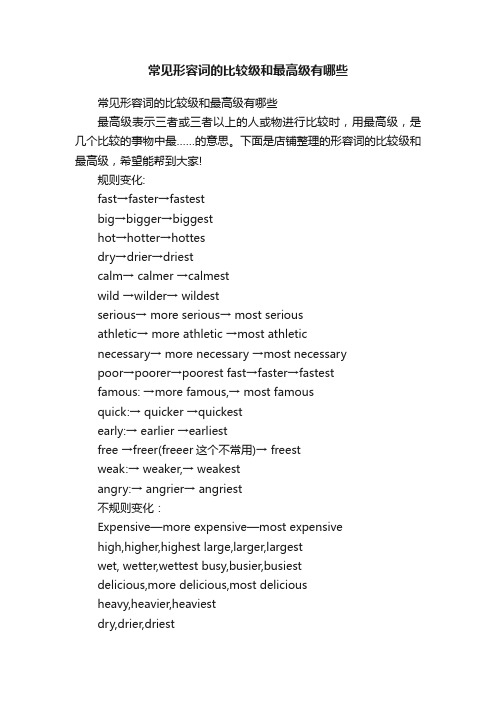
常见形容词的比较级和最高级有哪些常见形容词的比较级和最高级有哪些最高级表示三者或三者以上的人或物进行比较时,用最高级,是几个比较的事物中最……的意思。
下面是店铺整理的形容词的比较级和最高级,希望能帮到大家!规则变化:fast→faster→fastestbig→bigger→biggesthot→hotter→hottesdry→drier→driestcalm→ calmer →calmestwild →wilder→ wildestserious→ more serious→ most seriousathletic→ more athletic →most athleticnecessary→ more necessary →most necessarypoor→poorer→poorest fast→faster→fastestfamous: →more famous,→ most famousquick:→ quicker →qu ickestearly:→ earlier →earliestfree →freer(freeer这个不常用)→ freestweak:→ weaker,→ weakestangry:→ angrier→ angriest不规则变化:Expensive—more expensive—most expensivehigh,higher,highest large,larger,largestwet, wetter,wettest busy,busier,busiestdelicious,more delicious,most deliciousheavy,heavier,heaviestdry,drier,driesteasy easier easiestlazy lazier laziestpretty prettier prettiestnaughty naughtier naughtiestmealy mealier mealiestearly earlier earliestthirsty thirstier thirstiestfar→farther→farthestfar→further→furthestDull—duller--dullestLoud-louder--loudestBoring—more boring—most boringCreative—more creative—most creativeWarm---warmer--warmestgood / well→better→bestbad / ill→worse→worstmany / much→more→mostlittle→less→leastlate→later→ / latestlate→latter→last【拓展】关于形容词和副词的比较级一、含义1. 大多数形容词和副词有三个等级:原级、比较级、最高级: good – better - best2. 比较级:表示两者(人或物)之间的比较。
形容词的比较级形式
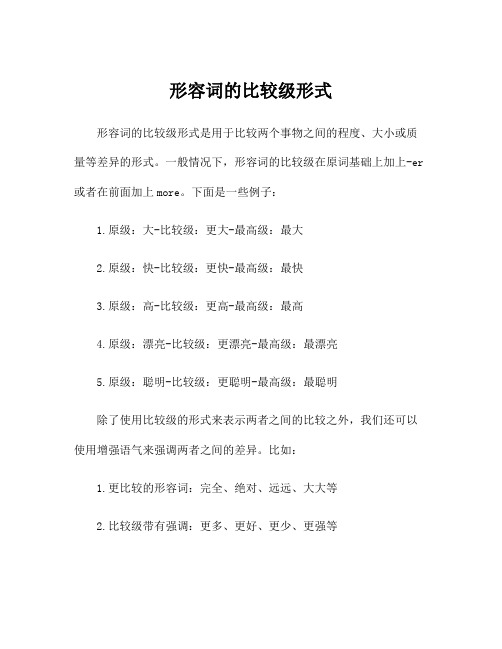
形容词的比较级形式
形容词的比较级形式是用于比较两个事物之间的程度、大小或质量等差异的形式。
一般情况下,形容词的比较级在原词基础上加上-er 或者在前面加上more。
下面是一些例子:
1.原级:大-比较级:更大-最高级:最大
2.原级:快-比较级:更快-最高级:最快
3.原级:高-比较级:更高-最高级:最高
4.原级:漂亮-比较级:更漂亮-最高级:最漂亮
5.原级:聪明-比较级:更聪明-最高级:最聪明
除了使用比较级的形式来表示两者之间的比较之外,我们还可以使用增强语气来强调两者之间的差异。
比如:
1.更比较的形容词:完全、绝对、远远、大大等
2.比较级带有强调:更多、更好、更少、更强等
此外,有一些形容词的比较级形式是不规则的,需要特别记忆,例如:
1.原级:好-比较级:更好-最高级:最好
2.原级:少-比较级:较少或更少-最高级:最少
3.原级:远-比较级:较远或更远-最高级:最远
在实际应用中,可以根据需要使用适当的比较级形式来表达差异和强调。
形容词变比较级的规律

形容词变比较级的规律形容词的比较级是英语中用来表示两个或多个事物之间比较高低、优劣、大小、程度等关系的一种形式。
下面是:1. 一般情况下,在形容词的后面加上-er来构成比较级。
例如:- tall(高)→ taller(更高)- fast(快)→ faster(更快)- strong(强壮)→ stronger(更强壮)2. 对于以e结尾的形容词,直接在后面加上-r。
例如:- large(大)→ larger(更大)- cute(可爱)→ cuter(更可爱)3. 对于以辅音字母+y结尾的形容词,要将y改为i,再加上-er。
例如:- happy(快乐)→ happier(更快乐)- pretty(漂亮)→ prettier(更漂亮)4. 以重读闭音节结尾、末尾只有一个辅音字母的词,要双写这个辅音字母再加上-er。
例如:- big(大)→ bigger(更大)- hot(热)→ hotter(更热)5. 一些以不规则形式变化的形容词,要格外注意,比如good(好)要变为better(更好),bad(坏)要变为worse(更坏)。
6. 另一些形容词则是使用more或less来构成比较级。
例如:- beautiful(美丽)→ more beautiful(更美丽)- interesting(有趣)→ more interesting(更有趣)7. 有些特殊的形容词,其比较级和原级是一样的,比如early(早),late(迟),等等。
这些形容词在比较级前面需要加上more或less。
例如:- early(早)→ more early(更早)- late(迟)→ more late(更迟)总的来说,要正确掌握形容词变比较级的规律,需要多加练习,熟练掌握各种形容词的变化规律。
此外,也要注意一些特殊的形容词,不仅要掌握它们的比较级形式,还要理解并运用它们在句子中的用法,从而正确表达出比较的意思。
希望以上内容能够帮助你更好地掌握形容词变比较级的规律。
形容词的比较级

在形容词比较级后,通常不直接加定冠词“the”。
详细描述
在英语语法中,定冠词“the”用于特指某个或某些特 定的人、事物或概念。而在形容词比较级的用法中, 比较的是两个或更多事物的一般属性或特征,因此不 需要特指某个特定的对象,所以通常不直接在比较级 后加定冠词“the”。例如,“I have a bigger car than the one you have”这句话是错误的,因为 “bigger”后面不应该直接加“the”。
形容词比较级与否定词连用
总结词:表示强调
详细描述:形容词的比较级与否定词连用时,还可以表示强调,突出某个属性或特 征的特殊性或与众不同之处。例如,“He is not the tallest person in the room, he is the shortest.”(他不是房间里最高的人,而是最矮的人。)
总结词
在形容词比较级前,通常不加冠词,如“a”或“the”。
详细描述
形容词比较级用于描述两个或更多事物之间的相对差异,冠 词用于限定名词,因此在比较级中并不需要添加冠词。例如 ,“apples are bigger than oranges”中,形容词比较级 “bigger”前没有加冠词。
比较级后不加定冠词
形容词比较级的构成方法
以“e”结尾的形容词,在后面加 “-r”,例如“nice”的比较级是 “nicer”。
以“辅音字母+y”结尾的形容词, 改“y”为“i”,再加“-er”,例 如“happy”的比较级是 “happier”。
一般在形容词后面直接加“-er”, 例如“tall”的比较级是“taller”。
形容词比较级与副词的搭配使用
总结词
增强表达效果
形容词比较级和最高级

B,哪一个更…”
Which is better, this one or that one? 3、程度副词even(甚至…)、 much(…的多)、 a lot(…的多)、a bit(…一点儿),a little(…一点儿)
hard large
harder larger
big
bigger
thin
thinner
wet
wetter
happy dry early
difficult popular
happier drier earlier
more difficult
形容词比较级的规则变化:
1、单音节词比较级在词尾加er,最高级加est
5、多音节词和部分双音节词,比较级在词前加 more,最高级在词前加most
原级 good well bad/badly ill many much little
far
比较级
better worse
最高级
best worst
more
most
less
farther较远 further进一步
least
( clean ) 3. Tim is _c_l_e_ve_r_e_r_ than Denis Dragon.
( clever ) 4. I think she looks m__o_re__b_ea_u_t_if_u_lthan in the
photo.( beautiful ) 5. The problem is _m_o_r_e_im__p_o_r_ta_n_t_ than that
比较级的几种形式

比较级的构成一、形容词级的构成1. 单音节形容词的比较级以及以-ly, -er, -ow结尾的形容词在词尾加-er;以e结尾的形容词在词尾直接加-r构成,重读闭音节双写末位字母再加er。
dark→darker; quick→quicker; ; clever→cleverer; simple→simpler; narrow→narrower。
2. 多音节形容词的比较级在其前加more构成。
important→more important; beautiful→more beautiful。
3. 表语形容词以及由分词变来的形容词,在其前加more构成。
afraid →more afraid; interesting→more interesting; pleased→more pleased。
4. 少数形容词的比较级是不规则的。
good/well→better; bad/ill→worse; far→farther / further;much/many→more;little→less5.以辅音加y结尾的,把y变i,加er。
early→earlier;funny→funnier基本句型原级比较1.由“...as + 形容词+ as...”或“...as + 形容词+ 名词+ as...”构成。
My grandpa is as energetic as a young man.Exercise is as useful a way as any other to lose unwanted weight.I try to find as much information as I can about what happened.2.由“...not so (as) + 形容词+ as...”或“...not so (as) + 形容词+ 名词+ as...”构成。
Luckily the weather was not so wet as it is today.不同级比较1.由“……形容词比较级+ than...”构成。
形容词的比较级

形容词的比较级
1. 形容词比较级:taller更高的,shorter更矮的,stronger更强壮的,thinner 更瘦得,older年龄更大的,younger更年轻的,bigger更大的,smaller更小的,longer更长的,heavier更重的。
2. 形容词比较级的构成:
(1). 一般直接加er, 如:tall—taller, short—shorter, small—smaller.
(2). 单音节词如果以e结尾,只加r, 如:strange—stranger.
(3). 闭音节单音节词如末尾只有一个辅音字母,须先双写这个辅音字母,再
加r,如:big—bigger, thin—thinner, hot—hotter
(4). 以辅音字母+y结尾的词,变y为i加er, 如:heavy—heavier, funny-funnier.
(5). 双音节和多音节词在前面加more, 如:more beautiful.
(6). 特殊形式,如:good—better, many—more.
3. A +is(are)+形容词比较级+than +B.
本句是形容词比较级的典型用法,表示A比B更….。
常用在两者在某一方面作比较时,如:You are 10 cm taller than me.你比我高10厘米。
The monkey is thinner that one. 这只猴子比那只瘦。
强化训练
翻译:
1. 你的狗比我的大。
2. 我比你大四岁。
Keys: 1. My dog is bigger than yours. 2. I’m four years older than you.。
- 1、下载文档前请自行甄别文档内容的完整性,平台不提供额外的编辑、内容补充、找答案等附加服务。
- 2、"仅部分预览"的文档,不可在线预览部分如存在完整性等问题,可反馈申请退款(可完整预览的文档不适用该条件!)。
- 3、如文档侵犯您的权益,请联系客服反馈,我们会尽快为您处理(人工客服工作时间:9:00-18:30)。
形容词比较级
如果我们要翻译〝他比较老〞,我们不能说
* He is more old.
而一定要说
He is older.
为什么呢?这是因为英文里面的形容词有所谓的比较级规则。
在下一节,我们讲一些最基本的规则。
1 最基本的规则
首先,我们要说明英文形容词有三个等级:原级、比较级和最高级,最基本的规则是根据音节的多少来分的。
一般来说,单音节的形容词在字后面加er,就变成了比较级,加est就变成了最高级,而双音节,或双音节以上的形容词,比较级是在字前面加more,最高级则是在字前面加most,举例来说,old, smart, strong, weak, high, low等
He is taller than his brother.
2 特殊的比较级规则
在上一节,我们说明了最基本的规则,那就是单音节形容词加er或est,双音节
的形容词前面加more或most。
但以下就是这些基本规则的例外。
(1)
(2)ier,或iest:
(3)er
(4)
英文中,有几个特殊的字,他们的比较级完全没有规则,以下是一些例子,读者
3 比较形的用法
大多数比较级句子里会有than,以下是一些例子:
I am older than he.
His English is better than mine.
San Francisco is more beautiful than New York.
His car is cheaper than your car.
He is the most diligent student in his class.
I like apples more than oranges.
He has more money than his brother.
He is stronger than his brother.
I am older than he (is).
She is more smart than I (am).
习惯上的is和am都省略掉的,由以上的解释可以看出,than后面的句词应该是主词,而非受词。
My head is larger than your head.或者 My head is larger than yours.
正确的句子应该是:
My house is larger than your house.
或者 My house is larger than yours.
The temperature of this city is higher than the temperature of San Francisco.
或者 The Temperature of this city is higher than that of San Francisco.
The height of Himalayas is greater than the height of Mt. Fuji.
或者 The height of Himalayas is greater than that of Mt. Fuji.
请注意以下的例子,句子中没有than,但仍有比较级:
Among all the teachers who have taught me, he is the best.
This is the best movie I have ever seen.
This food is the worst one which I have ever eaten.
John is the stronger one.
Do we have a better choice?
Mary is the more diligent one.
He is the older of the two.
He is one of the best movie actors.
This area is one of the hottest areas in the world. He is one of the fastest swimmers of America.
This is a book which I like most.。
